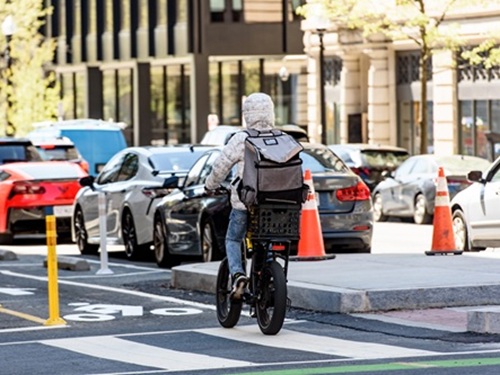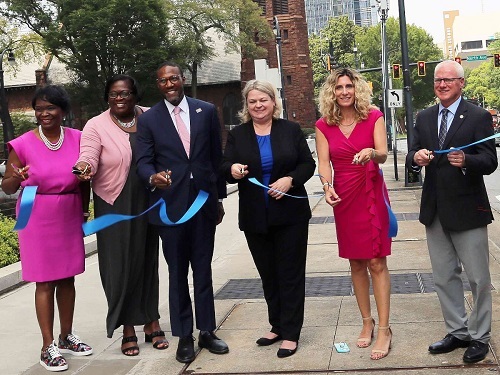The Georgia Department of Transportation recently hosted an event celebrating the receipt of waivers from the Federal Communications Commission allowing the agency to integrate Cellular Vehicle-to-Everything or C-V2X technology on roadways statewide.
[Above photo by Georgia DOT]
The agency said C-V2X technology enables data sharing between vehicles, transportation infrastructure, pedestrians and mobile networks to improve traffic flow, reduce congestion, and increase road safety.
To date, the Georgia DOT noted it currently has more than 700 intersections and interstate installations ready to deploy C-V2X technology in addition to the over 1,200 signalized intersections already deployed with connected vehicle technology.
Additionally, the department has developed a C-V2X roadmap that outlines a 10-year funding program to equip all signalized intersections on the state route system.
Examples of the capabilities C-V2X technology offers include:
- Emergency vehicle prioritization: Communication with traffic systems to ensure that first responders have priority on the roadway, improving response times through congested corridors.
- Reduced emissions: Communication with traffic signals can reduce idling at intersections helping to reduce emissions by 20 percent.
- Improved safety: Communications with other vehicles and transportation infrastructure can provide motorists with critical real-time information (hard braking, work zones, red light violation warnings, green light optimal speed advisory) that can prevent accidents and reduce fatalities.
“Our focus is always on safety and our ultimate goal at Georgia DOT is to achieve zero fatalities on our roadways,” said Russell McMurry, commissioner of Georgia DOT, in a statement.
“It is critical that we take a forward-looking approach and deploy new technologies quickly and safely to protect Georgia’s motoring public, and this technology gets us a little bit closer to our goal,” he added.
“Georgia is on the leading edge of deploying connected vehicle technology to make their roads safer for all: cyclists, pedestrians, constructions crews, and drivers,” noted Shailen Bhatt, administrator of the Federal Highway Administration.
“That is critical to advancing our shared mission of delivering a world class transportation system – in Georgia and across the entire country – that is safer, more efficient, more sustainable, and more equitable for all,” he pointed out.
“There are many other states deploying C-V2X technology but none at the scale and pace of Georgia,” said Laura Chace, president and CEO of ITS America. “The Georgia DOT is a national leader in this space. They believed in this technology, they invested in this technology, and they were ready to deploy as soon as the FCC’s waiver was granted and established a blueprint for other [state] DOTs across the country to follow.”
 States
States
Washington D.C. Launches E-Bike Food Delivery Pilot
July 18, 2025 States
States

